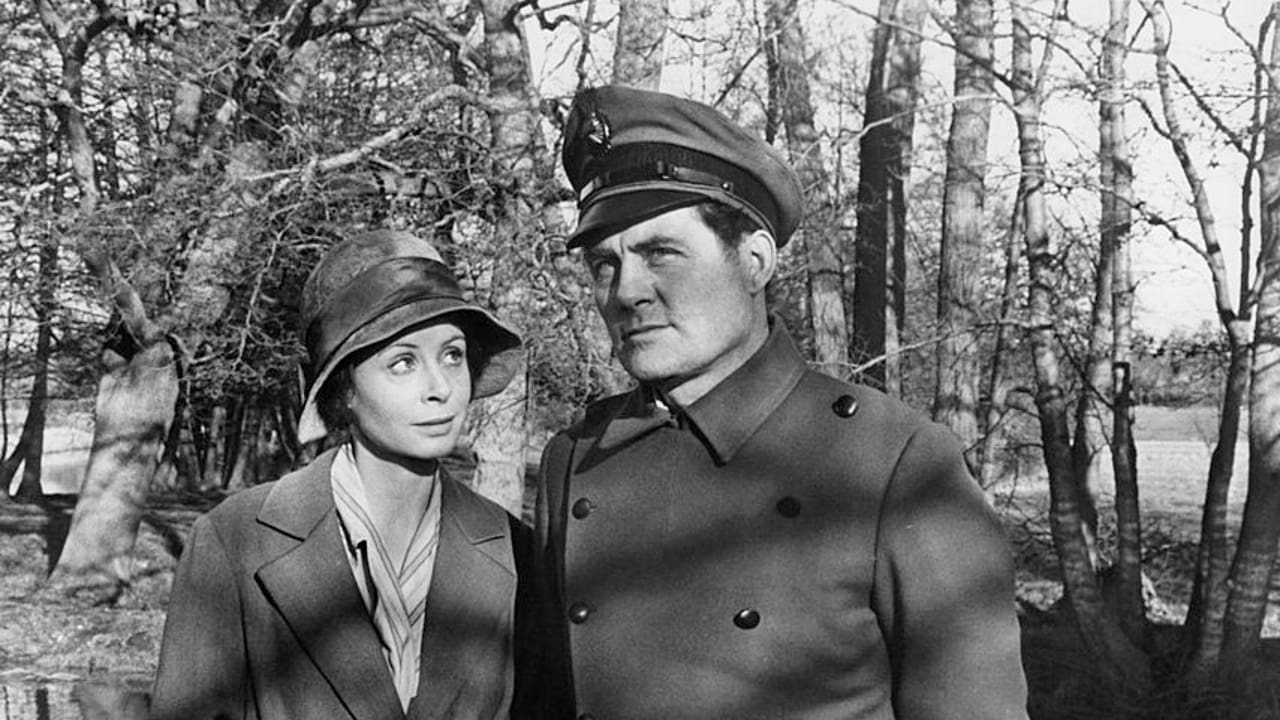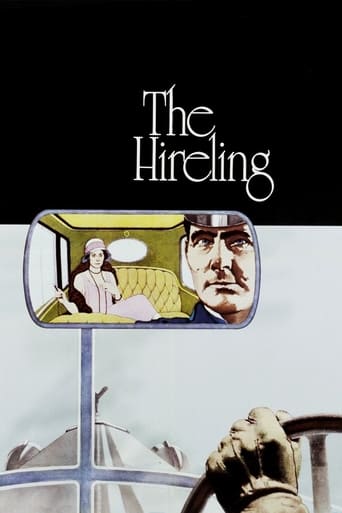



Such a frustrating disappointment
A Brilliant Conflict
The story, direction, characters, and writing/dialogue is akin to taking a tranquilizer shot to the neck, but everything else was so well done.
View MoreThrough painfully honest and emotional moments, the movie becomes irresistibly relatable
View MoreThoughtful study of the British class system, told from the perspective of one who essentially occupies its bowels, a chauffeur (Shaw) interacting with his employer (Miles), forming a close bond that threatens to transcend societal boundaries. Unfortunately for Shaw, his vulnerabilities mutate into misplaced fondness for Miles, a mentally crippled lady of standing whose only capable affections are for a recently returned war veteran (Egan).Slow moving, talky and ultimately (in my opinion) aimless - the climax is much anticipated, but the film ends quite abruptly and doesn't seem to me to do the narrative justice. Having not read the book, perhaps director Bridges was somewhat constrained by the manacles of the source material.Of the calibre that LP Hartley fans came to expect following "The Go Between" in 1971, "The Hireling" should appeal to anyone whose interested in the human drama, or perhaps, who admires the work of Shaw or Miles. Both are very realistic in their extremes, and of course, poignantly, in their common frailties. More narrative structure would have suited me better, even so, it's a sophisticated drama worth a look.
View MoreAfter watching "The Go-Between", author L.P. Hartley cried, being so moved by the cinematic representation of his novel. Had he been alive he may well have cried after watching "The Hireling" for the way his subtle novel had been vulgarized. But Hartley had died just before "The Hireling" was made and playwright Wolf Mankovwitz felt himself free to do as he pleased with Hartley's book. That in itself seems to be an act of great disrespect and worse, his changes are greatly detrimental to the work. It calls into question just what right does one have to so radically alter a work. There is little doubt that Hartley would ever have agreed to this version.It's a great pity. The bulk of the film is well done, both Robert Shaw and Sarah Miles delivering strong performances. Adhereing to Hartley novel the overall effect would have so much more compelling.Not only a disappointment, but a great annoyance at the presumption of lesser artists to tamper with the work of their betters.
View MoreI was recently given this film on DVD as a gift, and was unsure at first if it would appeal (although one of my favourite actors has a leading role). In fact, it's on its way to becoming a favourite.First of all: thankfully, it's *not* the same as the book, the ending of which I think is excessively melodramatic. Secondly: it's one of the best films I've seen about the First World War. "What?" you may ask. "It's not a war film!" True: we see no battles or bombardments, no trenches, no gas. But it shows the cost of war, the damage done to the lives of the men who fought in it, and the impact this had on those close to them.We first see Helen (Sarah Miles), a baronet's widow, awaiting her release from a mental hospital. All the women in the film appear to be widows: some from the war, but Helen's much-older husband, Sir Thomas (we see him later in a photograph) was taken ill and died while she was at a party, hence her guilt-stricken breakdown. She is lost and lonely. The wire around the hospital grounds evokes POW camps and the trenches: like many of the men in the outside world, Helen is suffering from a kind of shell-shock.Out of hospital, she has to find her feet in the outside world again: a world we experience through her eyes as bleak, desolate and unfriendly. Her mother is unable to provide her with any real support. Herself a widow, she has put up her own emotional defences, behind which she hides to avoid dealing with her daughter's distress. (Like many people, especially in that time, she seems to find mental illness embarrassing.)Ledbetter, the hired driver, becomes a supportive presence, and helps Helen begin to adjust to life again, but she does not realise that he is becoming dangerously obsessed with her. This is a superb performance by Robert Shaw. Ledbetter is a former regular soldier, an ex-sergeant-major who runs a boxing club and has set up his own car-hire business. Superficially, he seems tough and strong, dependable, but there are cracks beneath the surface: he has not really adjusted to civilian life. He invents (for reasons he later explains) a family and home life he does not have; he has brutal outbursts with colleagues, and affection-less sex. Getting close to Helen a woman whom, even with the greater post-war social freedom, he could not realistically have hoped to marry exposes psychological fault-lines that tear him apart. These days, one might diagnose PTSD.The same is true of the other man in Helen's life, aspiring politician Captain Hugh Cantrip (Peter Egan). He is ambitious, handsome, but also very young. Tellingly, his girlfriend, Connie (Caroline Mortimer), mothers him, combing his hair and making sure he has a clean handkerchief before he goes out. He is known to both Ledbetter and Helen: the former had served under him during the war, and Helen had met him in political circles and had thought him a "popinjay". However, he and Helen now begin a relationship, with Helen intending to support his political career, financially and emotionally. Peter Egan, fresh from his stage success as Stanhope in R C Sheriff's 'Journey's End', makes Hugh more than an immature cad. There is a revealing, understated scene in the back of the car between Helen and Hugh, in which they quote Brooke's 'The Old Vicarage at Grantchester'. She asks, of his war experience, "Was it very bad?" He cannot answer. She says: "Well, you're back now." But his softly-spoken reply "Am I? Sometimes I wonder " is the key to his character. As light and shadow flicker across his face, we know that there are some horrors that cannot be put into words. The disproportionate casualties suffered by junior officers of his sort straight out of school or university and expected to lead from the front are well-known. In a nervous speech (during which Helen reassures him) to local political folk at a dinner-party, he reveals that he will stand as an Independent, no longer as a Liberal (the party which had taken the country into the war). His emotional life is as damaged as Ledbetter's. He cannot easily extricate himself from Connie, who depends on him emotionally and financially: reading between the lines, she is probably a war-widow (perhaps of a former comrade?) with a child, whose drawings we see on the wall of her home.***SPOILERS***The crisis between the trio builds slowly, with a frightening scene between Helen and Ledbetter in the car, and Ledbetter listening in to Hugh and Connie when he is driving them, as Hugh tries to persuade Connie that, even as his relationship with Helen develops, they can continue theirs; that he will, at least, continue to support her. Jealousy, obsession and his belief that he must protect Helen from a duplicitous gold-digger lead Ledbetter to confront her and Hugh violently in her home.The ending is entirely different from that of the novel, and is better for it: it is dramatic, but less melodramatic, and maintains an unsentimental tone. We began with one character recovering from a mental breakdown; we end with another suffering one. Helen, one senses, is now wiser and stronger than both the men, who have been unable fully to adapt to the so-called 'land fit for heroes' to which they returned from the nightmare of total war. The new ending is open: one feels that she, at least, will cope with whatever lies ahead, without illusions. In this, it reflects well the reality of the time, in which women (Helen, Connie, and so many others) had to pick up the pieces of a world in which too many men had died or had come home with varying degrees of mental and physical damage. "Well, you're back now." "Am I? Sometimes I wonder "
View MoreThis is a thoughtful film that lays bare the inequities of the so-called upper class and those who work for them, the haves and have-nots. Robert Shaw does a creditable job in his role as the obliging, correct chauffeur, Steven Ledbetter, who helps Lady Franklin (Sarah Miles) overcome her mental depression at the outset. However, Steven has many mixed feelings regarding this lady of the upper class. He inevitably falls in love with her, which of course is overstepping the societal boundaries that separate them.I have not read anything prior to this and only judge the movie as I have seen it. I consider it a very honest story about the realities of daily living and the conflict of what we might wish or expect from life and what we get. It's a fine drama worth seeing again.
View More